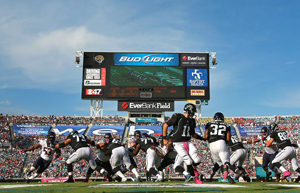The Jacksonville Jaguars and Tampa Bay Buccaneers are often lumped together: Florida NFL teams separated by a few hundred miles, modest fan bases, issues with attendance, struggling local economies, and owners who later bought English Premier League teams.
That may be so (though the Jaguars have sold out since 2010), but the teams’ business responses to their similar straits are different, perhaps no more in selling out and pricing tickets.
While the Buccaneers will not buy unsold tickets to ensure their games are televised locally and have been lowering ticket prices (see story, Page 1), the Jaguars do the opposite: committing to buy unsold tickets and raising prices.
 |
Unlike their fellow Floridians in Tampa, the Jaguars have shown a willingness to raise ticket prices and to buy unsold inventory to ensure all their games are on television.
Photo by: Getty Images |
“We think we should have all of our games on TV because that is our biggest marketing tool,” said Mark Lamping, Jaguars president.
Last year, the team sold out every game without purchases from owner Shad Khan, yet remains committed to snapping up unsold inventory if necessary this season.
And with the Jaguars at the bottom of the league in local revenue, Lamping concluded, “we have to significantly increase our ticket prices.” The team hiked prices 2.4 percent for this season on average, and that was coming off a 2-14 campaign.
When the Jaguars first came into the league in 1995, the club ranked second in local revenue. Now it is last, which is not a sustainable business model, Lamping said.
The Jaguars are working in other ways to increase revenue: expanding their local footprint in part by adding more radio and television station affiliates, and playing one game a year in London for the next four years.
The team has already seen a seven-figure revenue bump from London, Lamping said, largely because of the greater number of tickets sold (84,000 in London versus 66,000 in Jacksonville) and the higher London ticket price ($126 average versus $90).
That too comes with expense increases, though Lamping is confident the team can reduce those.
He was also instrumental in Khan’s purchase of Fulham Football Club this year, and the teams are working closely, already sharing athlete performance data.
By contrast, Brian Ford, the Buccaneers’ chief operating officer, said his club and Manchester United have no business ties, describing his relationship with his counterpart in Manchester as defined only by friendship.
Even the two teams’ in-stadium approach is somewhat different.
The Jaguars plan to show RedZone on their video boards continuously during games, not just to meet fan demands for more content, but in part to lower bandwidth within the stadium.
“We are not sure being tethered to your smartphone is the right thing to do long term,” Lamping said.
The Jaguars plan to install the league’s largest video screens in the end zones in time for the 2014 season. The boards are part of $63 million in stadium improvements that also will include building a new fan platform in the north end zone to replace 7,000 seats currently covered by tarps.
In contrast to the Jaguars’ approach to RedZone, the Buccaneers make RedZone available on an in-stadium app, and invested seven figures last year to upgrade Raymond James Stadium with Wi-Fi. RedZone is available in stadium clubs, and occasionally on video boards.
Why not Tebow?
Conventional wisdom is that the Jaguars’ business side would have loved to have signed local hero Tim Tebow, a move squelched early on by new general manager Dave Caldwell.
Jaguars President Mark Lamping says that it isn’t so, and the decision not to try to sign the quarterback included his input.
“Something of that magnitude was discussed at length with Dave, myself, Shahid [Khan], we talked a lot about that,” Lamping said. “He could have been a short-term answer to some timely issues.”
On the other hand, Lamping added, the Jaguars could have lost season-ticket holders who would have viewed the move as a marketing gimmick.
“I know we would have sold more tickets if we signed Tim Tebow, and we would have lost some season-ticket holders,” he said.




